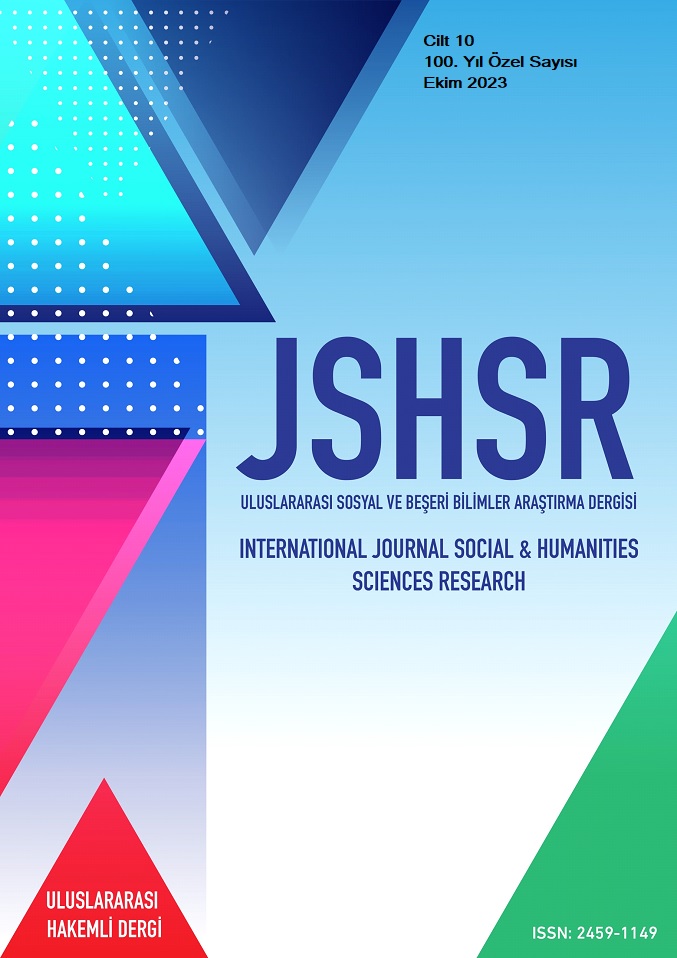The Role of Nato in the Fight Against Covid-19
DOI:
https://doi.org/10.5281/zenodo.10055751Keywords:
NATO, COVID-19, International OrganizationsAbstract
All societies of today need security organizations to reduce their safety-related concerns. The COVID-19 pandemic has shown that the safety of the individual and society is at least as important as the security of the state, and it is not possible to protect the rule of law and human rights and freedoms without democracy. This prominent characteristic of the new systemic order emerging in the environment of security and safety demonstrates that political and military organizations such as NATO may be necessary. The health and protection responsibilities of the armed forces fall upon member states, rather than NATO. However, this does not mean that NATO does not have a role to play in the fight against the pandemic, and as such, the member states that have been severely affected by COVID-19 have immediately resorted to the help of the Treaty. The response of NATO to the COVID-19 pandemic so far has demonstrated that the Treaty can play a significant relief role in the response of the member states to health-related emergencies. Since its establishment in 1949, the security policies of NATO have constituted a foundation for the formation of circumstances that would make these developments possible. This study discusses the role of NATO in the fight against the COVID-19 pandemic and the future of NATO in the post-pandemic period.
References
Akgün, B. (2020). Uluslararası Yönetişim Krizi. Kriter Dergisi, 46, 18-21.
Anadolu Ajansı (2020). Yeni Tip Koronavirüs NATO’yu da Vurdu. https://www.aa.com.tr/tr/dunya/yeni-tip-koronavirus-natoyu-da-vurdu/1787471
Baciu, C. (2021). Beyond the emergency problematique: how do security IOs respond to crises—a case study of NATO response to COVID-19. https://www.ncbi.nlm.nih.gov/pmc/articles/ PMC8237037/#Fn17
Birgün (2020). NATO Tatbikatına Koronavirüs İptali. https://www.birgun.net/haber/nato-tatbikatina-koronavirus-iptali-292516
Birol, A.F. (2020). Küreselleşme, Salgın Hastalıklar ve Güvenliğin Biyolojik Koşulları. Hakan Karaarslan ve Murat Demirel (Ed.) , Güncel Uluslararası Güvenlik Sorunları içinde (s.371-389). Nobel.
Büyük Ansiklopedi (1990). NATO. 11, 4146-4148. Milliyet Yayınları.
Demirci, M.C. (2020, Mart 26). Covid-19 salgını sonrası, tek kutuplu küresel sistem sona mı erecek? NATO’nun rolü ne olur?. Euronews. https://tr.euronews.com/2020/03/26/kuresel-kapitalist-sistem-sonu-mu-covid-19-koronavirus-sonra-yeni-duzen-turkiye-nato-rolu
Eadrcc Sıtuation Report #19 .(2020). NATO. https://www.nato.int/nato_static_fl2014/assets/pdf/ 2020/7/pdf/200702-EADRCC-0107_sitrep19.pdf
Erdağ, R. (2020). Koronavirüs Sonrası NATO’nun Geleceği. SETA, 319, 1-18.
Garamone, J. (2020), NATO Looks to Ensure Health Crisis Doesn't Become Security Crisis. NATO. https://www.defense.gov/News/News-Stories/Article/Article/2187309/nato-looks-to-ensure-health-crisis-doesnt-become-security-crisis/
Köksal, S. (2020, Mayıs 1). Covid 19 Sonrası Türkiye: ABD, Rusya, AB, NATO. Yetkin Report. https://yetkinreport.com/2020/05/01/covid-19-sonrasi-turkiye-abd-rusya-ab-nato/
NATO. (2018). Brussels Summit Declaration. https://www.nato.int/nato_static_fl2014/assets/pdf/pdf_ 2018_07/20180713_180711-summit-declaration-eng.pdf
NATO. (2021). Countering Terrorism. https://www.nato.int/cps/en/natohq/topics_77646.html
Okuduci, İ. (2020, Mayıs 7), Irak'ta siyasi ve güvenlik kriziyle koronavirüsten istifade eden DEAŞ saldırılarını artırıyor. Anadolu Ajansı. https://www.aa.com.tr/tr/dunya/irakta-siyasi-ve-guvenlik-kriziyle-koronavirusten-istifade-eden-deas-saldirilarini-artiriyor-/1832175
Shea, J.(2020, April 6). Never waste a good crisis: are pandemics NATO’s new security challenge?. Friends of Europe. https://www.friendsofeurope.org/insights/never-waste-a-good-crisis-are-pandemics-natos-new-security-challenge/
Roepke, W. D. and Thankey, H. (2019). Resilience: the first line of defence. NATO Review. https://www.nato.int/docu/review/articles/2019/02/27/resilience-the-first-line-of-defence/index.html
Rynning, S. (2020), A renewed collective defense bargain? NATO in COVID’s shadow. NDC Policy Brief, 16, 1-4. https://www.ndc.nato.int/news/news.php?icode=1468
Saraçoğlu, M.Y. (2015). Terörizmle Mücadele Kapsamında NATO’nun Dönüşümü ve Uygulamada Karşılaşılan Sorunlar [Yayımlanmamış Yüksek Lisans Tezi], 412288, SBE, Kara Harp Okulu.
Sönmez, E.K. (2020). Uluslararası Güvenliğin Sağlanmasında Uluslararası ve Bölgesel Örgütler. Emre Çıtak ve Sami Kiraz (Ed.), Uluslararası Güvenlik içinde (s.53-77), Orion.
Sönmezoğlu, F. (1996).Uluslararası İlişkiler Sözlüğü. DER Yayınları.
Stoltenberg, J. (2020), Welcome into the NATO family, North Macedonia!. NATO. https://www.nato.int/cps/en/natohq/opinions_174616.htm
Şiyhan, U. (2020, Haziran 16). Avrupa’da Artan İslamofobi ve 4 Ülkeye Kısa Bakış. Stratejik Ortak. https://www.stratejikortak.com/2020/06/avrupa-islamofobi.html
The Alliance's New Strategic Concept. (1991). NATO. https://www.nato.int/cps/en/natohq/official_ texts_23847.htm
Yalçıner, S. (2006). Soğuk Savaş Sonrası Uluslar Arası Terörizmin Dönüşümü ve Terörizmle Mücadele. Süleyman Demirel Üniversitesi Sosyal Bilimler Enstitüsü Dergisi, 2 (4), 98-119.
Yiğittepe, L. (2020a). NATO, Güvenlik Politikaları ve Stratejileri. Cinius.
Yiğittepe, L. (2020b). Uluslararası İlişkilerde Güvenlik, Kavramsal Analiz ve Teorik Yaklaşımlar. Nobel.
Downloads
Published
How to Cite
Issue
Section
License
Copyright (c) 2023 INTERNATIONAL JOURNAL OF SOCIAL HUMANITIES SCIENCES RESEARCH

This work is licensed under a Creative Commons Attribution 4.0 International License.


